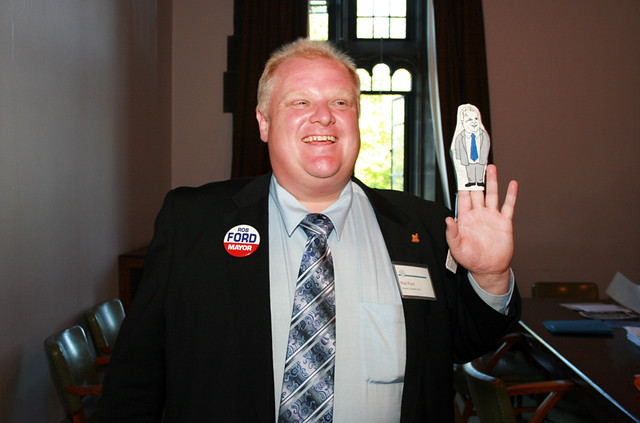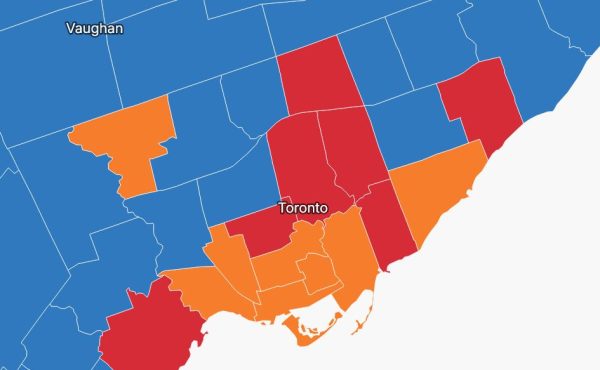
The editors of Spacing asked our long-time contributor Adam Chaleff-Freudenthaler to write a personal column on the motives and reasons why he and Toronto resident Max Reed petitioned the City of Toronto to audit the campaign finances of Mayor Rob Ford.
![]()
Earlier this month, Max Reed and I successfully petitioned for an audit of Mayor Rob Ford’s election campaign finances. Repeatedly we were asked about our motives, and for good reason. It’s no secret that Rob Ford and I disagree on both the style and substance of his mayoralty to date so the motives may appear to be entirely political. Knowing the reality of word limits, in response to the media questioning our motives, I often responded with a line like, “We want a level playing field for all candidates.” So I’d like to now expand on what I mean by that and why there is a lot more on the line than whether Ford will be prosecuted for what we allege were violations of provincial and municipal election laws.
As a starting point, among the general intentions of the Municipal Elections Act (MEA) is to facilitate fair elections that empower citizens to choose their leaders without undue influence by those with the deepest pockets. While it is far from perfect, the MEA largely accomplishes this by placing limits on how much an individual can donate, allowing Toronto to ban donations from corporations and unions, and, though candidates can donate as much as they like to their own campaign, placing a spending limit so no one can pull a Bloomberg. The province even sealed off backdoor contributions through loans by forcing them to be arranged only with recognized financial or lending institutions, and has taken care to ensure in-kind donations are subject to all the same rules as cash contributions.
With that in mind, the most important issue we identified in our compliance audit request relates to the financial relationship between Doug Ford Holdings (DFH) and the Rob Ford Campaign (RFC).
What we alleged, and Ford’s lawyer agreed with in his oral submissions to the Compliance Audit Committee, is that DFH paid more than $77,000 of bills for the RFC in the first few months of the campaign without being reimbursed until March, 2011. How to characterize this arrangement is where we diverge with Ford’s lawyer, who essentially claimed DFH was a supplier to the RFC that contracted with various vendors to provide things like an event venue, printing services, etc. Reed and I contend that this $77,000 was a loan. In either case, it is our contention that the RFC did not pay fair market value for the loan (no interest was charged) or, if you believe the supplier story, for DFH’s role as a supplier (no administrative costs were charged, no profit margin was built in and HST wasn’t included), which caused us to allege that the RFC received in-kind corporate contributions from DFH.
This may seem like we’re hung up on technicalities and small numbers but it’s anything but that. If the RFC’s relationship with DFH is deemed legitimate, it will mean a new and anti-democratic election finance model is born. Candidates could search out a rich benefactor – be it a business, union or wealthy individual – to front them the 1 to 2 million dollars it takes to run for mayor in Toronto by acting as a lender or “supplier,” ensuring that the candidate has all the financing they need to be successful right from the get go.
The importance of early money can’t be overestimated. It limits the need for campaigns to expend energy and scarce resources courting Torontonians for donations and makes it appear as though they have momentum by hosting extravagant events, securing prime campaign offices and conducting extraordinary advertising campaigns.
Though obviously partisan, George Smitherman campaign manager and former Toronto District School Board chair, Bruce Davis agrees and used this metaphor in a May 6 tweet: “Early money is like yeast,” it makes dough rise. Davis, who was a major player at City Hall during the Lastman administration and founded Urban Intelligence, one of the first full-service municipal lobbying practices in Canada, notes in that same tweet, “The Ford campaign’s method of start-up financing will change elections in Ontario forever.”
Or, for another testimonial on the importance of early money, read Jonathan Goldsbie’s recent Spacing interview with Shelley Carroll, who lamented her inability to secure early money as the reason she didn’t run for mayor in 2010.
If the Ford funding model is upheld, the only condition on receiving a benefactor’s money would be that the candidate has to pay back any funds received before the campaign officially ends (June of the year after Election Day). And as we’ve seen already, if you win the mayor’s seat it’s easy to raise a ton of money.
But here’s the twist: our elections are already tilted in favour of wealthy candidates. There is no limit on how much a candidate can donate to their own campaign so long as they stay within the spending limits. If Ford had spent his own money (he could even have sold part of his stake in his company if he needed liquid assets) instead of creating an arrangement between DFH and the RFC, he would have been clearly within the rules and our election finance laws wouldn’t be in peril.
Though I would like to see limits on how much a candidate can contribute to their own campaign, at least in the current system we know where the money is coming from so there are no private interests hiding in the shadows when we cast our ballots. That is why I believe it is worth fighting to preserve at least the status quo, and then pursue improvements to election finance laws.
Photo by Shaun Merrit




13 comments
Good for you Adam! Elected office shouldn’t only be the domain of the super-wealthy.
Bravo Adam and thanks for the explanation. Campaign finance is a tricky area in municipal politics especially, where a non-partisan framework and crowded fields (as well as the ever-important developer-municipality nexus) make it possible to swing campaigns with dollars.
Good luck with the audit, and hopefully even if the audit OKs this practice, the laws can be changed for the future.
Adam your explanation makes no sense to me in the context of a mayoral election that had the Toronto Star speculating for months in late 2009 about Mr. Smitherman’s status as a candidate (what was the value of that “in kind” free publicity?) and John Laschinger supporting Giambrone’s bid as early as January 2010 with Mayor Ford not even declaring until March 26.
More generally I think the question needs to be asked if these type of campaign laws are actually holding Toronto back. By vilifying business leaders of all stripes as the Pinko crowd has been want to do you may be denying our city its most effective leaders. If Transit City is important to you imagine Bryan Colangelo selling it. Or Heather Reisman speaking up for the Fort York bridge. How about Charlie Baillie or Jim” Balsillie or Jerry Schwartz as mayor?
Neocon, there was lots of speculation about many candidates in all of Toronto’s media outlets. Though the Star was quite obvious about its biases, so was the Sun in its anti-Smitherman/pro-Ford bias. Given what’s in the MEA about media, it would take some awfully sophisticated analysis to determine that any laws were broken on that front. We also didn’t make any allegations about the poll that Ford freely admitted conducting in January 2010, which on February 2, 2010 he announced as placing him in third place in a race he wasn’t registered for. Though there were probably infractions committed by all campaigns related to pre-campaign spending and many other things, we limited our allegations to only what we felt we could prove to the degree necessary to prevent costs from being ordered against us, as Max nor I are in a position to shoulder that burden.
On your broader point that we should be encouraging wealthy elites to seek our city’s highest office: that’s perfectly fine but if they’re that good they’ll be able to win an election within the confines of the current rules.
I think what keeps high profile people out of politics is the extraordinary scrutiny they would face (does Reisman want her purchase of a coffee machine to become headline news when she can be plenty influential, make tons more money and likely do far less work outside of public office?) and the reality that in Toronto, unlike major US cities, we have a weak (though now a bit stronger than before) mayor system that would prevent a business executive from running the city as they do their private ventures.
The Audit Committee is incompetent.
Compliance Audits cannot be filed against Ford until after September 30.
Therefore, you were not successful. Yet.
The decision to grant the audit has to be set aside by the Court, and will be. Not because Ford has something to hide but because the law was not followed – by the COMMITTEE.
Also, the Committee was not allowed to permit submissions to be made to it before deciding to grant the audit yet they permitted Ford to make one.
Eactly what provincial MEA is this Committee following?
It is certainly not Ontario’s.
Sheesh!
MEA Expert, It will be detailed in our factum but in short: there is recent case law that says you’re wrong about Sept. 30. I also have no reason to believe the committee erred in any way. Do you have case law or at least a reference to the MEA that would convince me otherwise?
The MEA is penal statute. Ford could get a fine, go to jail, be removed from office, be denied the right to vote, be denied the right to run for office in the next election, and be denied the right to be appointed to office.
Because a penalty is involved the MEA is given a strict interpretation, which means the MEA says what it means and means what it says. The MEA must be applied as we find it.
Ford was granted a election campaign extension as he had a deficit.
MEA s. 81(3) provides the deadline to file an audit application. It provides 4 options; (a), (b), (c) or (d). Only one option applies. And only one option applies AFTER THE LATEST OF
Deadline
81(3) The application must be made within 90 days after the latest of,
(a) the filing date under section 78;
(b) the candidate’s supplementary filing date, if any, under section 78;
(c) the filing date for the final financial statement under section 79.1; or
(d) the date on which the candidate’s extension, if any, under subsection 80 (4) expires.
MEA s. 81(3)(b) applies to Ford and the supplementary filing date is September 30.
Here’s the real funny part. The Committee’s decision was unanimous. All 3 voted to grant the audit.
Douglas Colbourne – an arbitrator who does not know how to interpret law.
John Hollins – the CEO of Elections Ontario for 10 years and who does not know how to interpret law – and election law to boot.
Virginia MacLean – a veteran municipal affairs lawyer who does not know how to interpret law. And this person sat on other at least 7 other City compliance audit committees.
Then we have a few professors chiming in claiming it’s all-good.
Comedy Gold.
Also, if anyone should know that MEA s. 81 is a Complete Code, it would be MacLean. Section 81 does not permit submissions to be made to the Committee. Nor does it provide for Committee member inquiries of the candidate prior to deciding if an application will be granted or rejected.
Any practice and procedure created by the Clerk under s. 81.1(4) cannot conflict with s. 81, and if they do, as they do here, they are null and void.
If this audit were to go ahead now, it is not done in good faith and Ford could sue the auditor under MEA s. 81(16).
If you were an auditor would you accept the job under current circumstances?
If this audit goes ahead now, Rob Ford’s Charter rights are infringed and he can seek damages.
The audit is being set aside because I said so. And I only say so because what has occurred thus far is illegal.
Douglas Colbourne, the chair, is a chartered accountant and arbitrator who held the post in the last council, as well as for the Toronto District School Board. He is also a planner and served for several years as the chair of the Ontario Municipal Board.
John Hollins ran North York’s elections office for a decade and then took over with the amalgamated city in 1998. From 2001 to 2008, he served as CEO of Elections Ontario, during which time he helped build a permanent electors registry.
Virginia MacLean, a veteran municipal affairs lawyer who practises in Oakville, has worked in legal services for the provincial government and the City of Mississauga. She also serves on the compliance audit committees of other municipalities, including Oakville, Aurora, East Gwillimbury, Georgina, Richmond Hill, Whitchurch-Stouffville and the Township of King.
I noticed you hired a lawyer. This is a not a bad idea, however, you are not a party to the appeal. The appeal is between Ford and the Committee.
You will have to seek court approval to be added as a party. The Court is not required to add you and I doubt they will as your participation in the matter is not required.
If this appeal even proceeds, by the time it is finished and a decision is issued it will probably be September anyway.
Legally speaking, your audit application can only be filed after September 30, so either way nothing will happen soon.
I’m not trying to discourage you, just being realistic so you realize the time frame.
You must also be aware that when Ford wins the appeal he will seek costs. Your lawyer may be working pro bono, (I think I read that somewhere) but Ford’s lawyer is not.
So you’re better off not being added as a party otherwise you’ll end up having to pay costs to Ford.
Bear this important fact in mind before you decided to become an added party.
I appreciate your perspective but safe to say we — max, lawyers and I — disagree with you on a number of fronts. Because we’re now in litigation I’m not going to discuss specifics but you’ll understand our position quite clearly when we file our factum.
I appreciate your position.
You biggest hurdle is overcoming the words “AFTER THE LATEST OF” in MEA subs. 81(3). In my view you will never overcome this, as there is many other Acts with this same phraseology and case law to define it. If I were you, I’d do some research before you commit to being added as a party.
In any event, I find this whole matter very intriguing.
Seriously, how did Virginia MacLean get appointed to this Committee?
“I quite frankly think you can’t have more than one audit, and we have made that decision,” said Virginia MacLean, a member of the committee, before it dismissed the latest application by David DePoe, a retired teacher.
http://news.nationalpost.com/2011/06/06/city-committe-rejects-application-for-another-ford-audit-as-mayors-finances-come-under-scrutiny/
The auditor is not going think up every scenario possible and try and find an error for every single possible thing. He is only auditing what the Committee approved.
The RV has now not been approved. All the auditor will do now is see Ford billed as expense $400 for a RV (or whatever the amount was). He will look for the RV invoice. When it matches – end of story.
It’s not the auditor’s job to phone around and see if he was a fair price. He’s not even looking at the RV issue as it was not approved.
More importantly, there is NO limit on how many audits can be requested or approved. Each audit request was on a different ground and must be considered as such.
The Court has already determined this and the Committee were bound by that Court decision.
Citation: Vaughan (City) v. Defrancesca et al., 2008 ONCJ 762
http://www.canlii.org/en/on/oncj/doc/2008/2008oncj762/2008oncj762.html
[11] I note as well, if the electorate is wrong, and the auditor finds no violation, then the electorate is at the risk of having to pay the costs of the auditor. There is, therefore, little or no down side to the municipality to have the matter looked into by an auditor. If there has been a violation then it should be properly investigated. If there has been no violation, then there would be no cost to the municipality as it is the electorates who must bear the cost of the audit.
Good thing everyone get to re-file their applications after September 30.
Here’s a great case.
Citation: Vaughan (City) v. Mastroguiseppe, 2008 ONCJ 763
http://www.canlii.org/en/on/oncj/doc/2008/2008oncj763/2008oncj763.html
It might even be the case you are relying on. I am not sure if the decision was appealed but I would’ve appealed it because it is wrongly decided, in part.
First, the Court correctly decided that more than one audit could be ordered. This proves Virginia MacLean and the Committee are incompetent when they denied the RV audit.
[58] I am not in agreement that the Act contemplates only one compliance audit. First the legislation does not state only one audit is available. Secondly, this interpretation does not consider that more than one elector may make an application within the 90-day period in s.81(2) of the Act. If that occurred, within 30 days of each application the City must consider that application. On that basis alone, it is possible that two meritorious applications could be received which would require two audits.
The Court than errs in claiming an audit application can be filed after any filing period.
[60] I have considered the grammatical and ordinary sense of the words in section 81(2) of the Act and the broader context as well as the consequences of any action taken by the City, all of which in my view require that the City be able to fulfil its screening function expeditiously so that a candidate is protected and so that the public interest in ensuring election campaign finances are conducted pursuant to the legislation is protected. The public has an interest in ensuring that valid attacks on campaign finances be audited so that any wrongdoing can be dealt with quickly. I conclude therefore that s.81(2) of the Act refers to a 90-day period following each of the filing periods referred to therein. I do not agree with the Appellant that the period continues beyond any one 90-day period. Such an interpretation would be overly long and unfair to a candidate. An elector must file an application within 90 days of the specific filings referred to in s. 81(2) of the Act.
The words “after the latest of” cannot be anymore clear. Nevertheless, the government attempted to make it more clear in its 2009 amendments by breaking down former MEA subs. 81(2) into separate clauses, i.e., “after the latest of” (a) or (b) or (c) or (d).
48] One of the issues on this appeal was whether the Application satisfied the filing criteria in s.81(2) of the Act. That subsection provides:
“(2) The application shall be made to the clerk of the municipality or the secretary of the local board for which the candidate was nominated for office, within 90 days after the later of the filing date, the candidate’s last supplementary filing date, if any, or the end of the candidate’s extension for filing granted under subsection 80(6), if any; it shall be in writing and shall set out the reason’s for the elector’s belief. “
The word “or” in MEA subs. 81(3) is disjunctive.
The MEA also employs the words “before the earliest of”. This means the first event, as oppsed to “the latest event” which means the late event. The MEA also employs the words “the greatest of” which means the highest amount of the provided options.
This is simple stuff.
Any rebuttal?
This matter was appealled but Jackson did not argue on appeal the issue of later of.
Citation: Jackson v. Vaughan (City), 2010 ONCA 118
http://www.canlii.org/en/on/onca/doc/2010/2010onca118/2010onca118.html
Before the MEA was amended in 2009 the section read “within 90 days after the LATER of”
Today it reads “within 90 days after the LATEST of”
The change from later to latest was meaningful.
Any ambiguity in the wording goes in Ford’s favour.
I’m never wrong, which is why I am the expert.